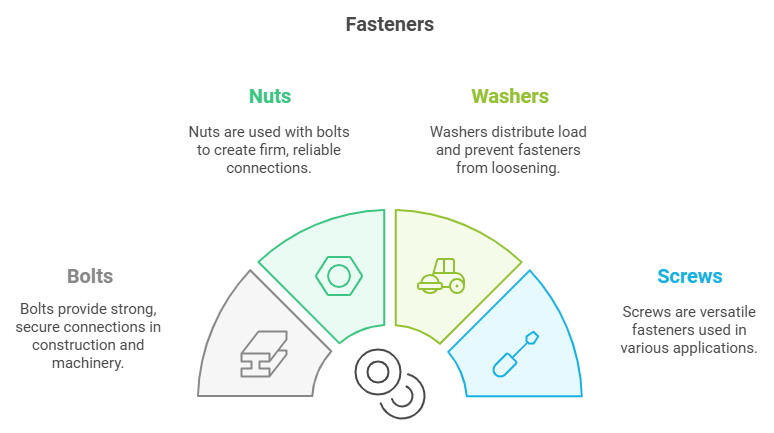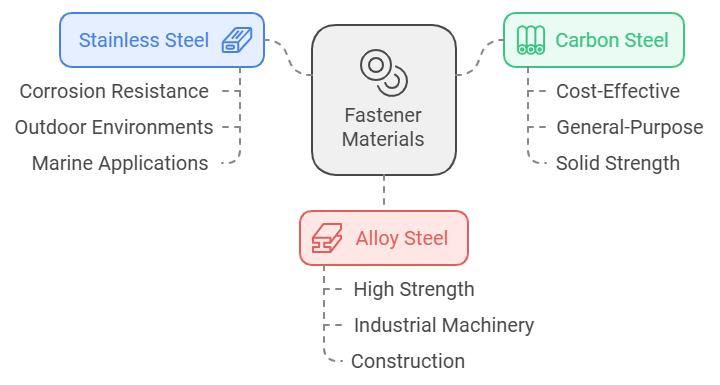Fasteners 101: A Beginners Guide to Essential Hardware
Fasteners are the unsung heroes in many projects and industries. From skyscrapers to everyday objects, these small but essential parts help to keep things together. Whether you are newly introduced to working with hardware or it's the start of a self-performance domestic item, understanding the beginner's guide to fasteners is vital to ensure proper usage and functionality in every application.
In this guide, we will look at what basics have to be mastered (types of fasteners), why you should choose those suitsings for yourself or a customer, and considerations like material and size which may affect their performance.
Introduction: What are Fasteners?

Fasteners are a type of hardware item whose primary function is to fasten or hold closed two or more objects. Fasteners come in all shapes and sizes and are constructed from several different materials. They are used to secure elements of a machine, structure, or thing all the time, under stress and movement. Bolt, screws, nuts, washers, and items like them.
In other words, fasteners are the tools that keep everything in any construction job or daily life held down and tight.
Common Types of Fasteners
There are several basic fasteners that you'll encounter most often. Here's a quick overview of the most common types:
Bolts
Bolts are one of the most widely used fasteners. They usually consist of a threaded shaft and a hexagonal head that can be rotated with a wrench. Hexagon bolts, with six flat sides, are particularly popular in construction and machinery. Bolts are used when a strong, secure connection is required between components, as in the case of steel structures, vehicles, and equipment. Normally, a bolt will be used together with a nut to achieve secure fastening.
Nuts
Nuts are used in combination with bolts to create a firm connection. The bolt passes through the holes of the parts to be joined and the nut is turned down onto the end of the bolt, giving a firm grip. Hex nuts are the most common type of nut, and they are often paired with hex bolts.
Nuts come in various forms, including self-locking nuts, which prevent loosening due to vibrations, making them ideal for applications that involve heavy machinery or automotive parts.
Washers
Washers are thin, flat disks used to distribute load and prevent fasteners from loosening. They sit between the nut and the material being fastened, creating a larger surface area to reduce wear and tear on the material. Flat washers are the most common type, but spring washers and lock washers are also available for specific needs, such as preventing the fastener from loosening over time.
Screws
Screw-the term is being used here literally, since it can denote, by metonymy, something secondary to a bolt. Of course, you knew that. Going back to English 101 on Morley Avenue in 1968
Understanding Fastener Sizes
The screw is an alternative to the bolt. You typically need to pre-drill a hole for it as, unlike bolts, it has a self-tapping thread and can make its hole-in material.
It is most commonly used for woodworking and drywall installation, where there is no need for pre-drilled holes in the fastenings that hold everything together The threaded shaft of a screw strongly fixes substances together. There are several screw varieties available to fit any particular needs.
• Diameter:This is the width of the fastener’s shaft or thread, and it is important for determining the appropriate hole size.
• Length:The length refers to how long the fastener is, from the tip to the head. The length must be adequate to secure the materials being fastened.
For example, an MIO x 50 mm bolt has a diameter of 10 mm and a length of 50 mm. When choosing a fastener, ensure that both the diameter and length suit the project requirements, such as the thicknesses of whatever materials are being brought together.
Materials Matter: Beginner's Guide to Fasteners

The material of a fastener affects its strength, durability, and resistance to wear and corrosion. The most common material used for fasteners is steel because it offers not only strength but dependability. However, various versions of steel are available.
There is carbon steel, stainless steel (also known as Inconel), and alloy steel. All of them have specific advantages depending on what kind of application they are applied to.
• Stainless steel is often used in applications where corrosion resistance is required, such as in outdoor environments or marine applications.
• Carbon steel is a more cost-effective option for general-purpose fasteners and provides solid strength.
• Alloy steelis used for high-strength fasteners in heavy-duty applications, such as in industrial machinery or construction.
Choosing the right material ensures that the fastener will perform well under the intended conditions.
Basic Fastener Selection
Selecting the correct fastener for a project can be daunting, but here are some simple tips to get started:
1. Identify the materials you're working with: Consider the materials you're joining (wood, metal, concrete, etc.) and choose fasteners that are compatible with those materials.
2. Determine the load requirements:Heavy-duty applications, such as construction, will require stronger fasteners (e.g., high-tensile bolts), while light-duty tasks, such as assembling furniture, may require smaller, less robust fasteners.
3. Consider environmental factors:Will your fasteners be exposed to moisture, chemicals, or extreme temperatures? If so, materials like stainless steel may be needed to prevent corrosion.
Conclusion: Fasteners - The Unsung Heroes of Everyday Life
Fasteners may seem simple, but they play a crucial role in holding everything together—literally. Whether you’re building a structure, assembling machinery, or simply fixing furniture, the right fasteners ensure that your project remains secure and functional.
By understanding the basic types, sizes, materials, and applications of fasteners, beginners can make informed decisions and select the best hardware for any task.
Call to Action
Need help finding the right fasteners for your next project? Husaini Brothers offers a wide selection of essential hardware for all your needs. Visit our website at [insert website address] or call us at +971 4 2223024 for expert advice and assistance.
Read More: The Importance of Proper Fastener Installation and Maintenance
Get a Free Quote